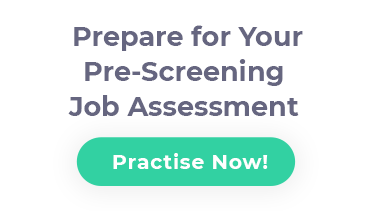UPS English Test, Literacy Test, Hiring Process & Interview Questions Online Preparation – 2025

What Is UPS?
UPS, an acronym for United Parcel Service, is a multi-billion-dollar courier company headquartered in Atlanta, Georgia. Since 1907, UPS has expanded to service over two hundred companies and territories with around 534,000 employees worldwide. The Fortune 100 company hires in a few key areas:
What Is the UPS Hiring Process?
UPS employs a complex hiring process as a way of finding the best of the best. As an ever-growing and innovative company, UPS searches for creative minds and diligent workers with four rounds of recruitment. These rounds include:
- Application
- Initial Phone Screening
- Pre-Employment Testing
- Final Interview
UPS Application Process
UPS vets its applicants holistically. This means that they look at criteria beyond grades, job history, and qualifications. The company makes it a point to weigh additional factors such as past projects, experiences, and other accomplishments. UPS prefers candidates with both strong and unique resume. Applicants will be notified of their standing within a week of applying.
Initial Phone Screening
UPS contacts the candidates at this stage to conduct a brief competency interview. The majority of questions revolve around the candidate’s resume. The interviewer will concentrate on a few particular areas and ask that they be expanded on. Then, the questions evolve to inquire how the resume represents the candidate’s strengths and how these strengths could be an asset to UPS.
UPS Hiring Assessment Tests
If you were successful during the initial phone screening, UPS will invite you to take a few assessments. Depending on the hiring season, they may ask you and a few other candidates to come take the tests onsite. Most candidates will receive the assessments via a link in their email and will be asked to take them online.
The pre-employment tests are the third stage of UPS’s interview process. UPS utilises these assessments to gain objective insight into the aptitude and personality of the applicant. Different fields and locations mean that not everyone will be taking the same assessments, however, UPS commonly administers the following tests:
- Situational Judgment Test
The situational judgment test, or SJT, examines behaviour through a series of hypothetical scenarios. The test-taker must read a brief passage detailing a workplace conflict, then choose which course of action is most appropriate. UPS uses the SJT to understand how a candidate would work with teams and fit in with the environment at UPS. The test is untimed and multiple-choice.
- Pre-Employment English Test
- Personality Test
The personality test resembles a survey more than it does a test. The candidate is provided with a series of statements about different preferences and character traits. They must then mark how much they agree or disagree with the statement on a five-point scale. The results will inform UPS of some basic qualities such as how team-oriented the person is, if they are a leader or not, how sociable they are, etc.
- Numerical Reasoning Test
The numerical reasoning exam is a math-based aptitude assessment. Most corporate positions ask that candidates partake in this test, especially those in finance. The test follows a very simple pattern; there will be a graph or table of data that must be evaluated through three to five questions. In a limited amount of time, the candidate must perform basic mathematical operations using the data to find an accurate solution for the problems. Each question has five answer choices.
- Pre-Employment Literacy Test
- Excel Test
Final Interview
The final interview will take place at one of the UPS offices in front of a panel. The panel will be made up of a hiring manager and a key UPS team member in your field, at the very least. Questions will be job-specific and will include inquiries about the responsibilities of the role and how the candidate plans to fulfil them.
Job history and other qualifications will also be brought into question. Typically, the interviewer will ask what experiences have helped you become better suited for the role. They will also ask tough behavioural questions such as “Have you ever disagreed with a coworker and how did you handle it?” or “How do you handle difficult customers or clients?”. Before the interview, candidates should do background research on the company and their recent developments. This information may come into question during the interview as well as why the candidate is interested in working for UPS.
How to Prepare for UPS’s Online Assessments?
UPS’s online assessments are a significant part of the interview process. They are in place specifically to narrow the candidate pool and UPS has a high predetermined benchmark that they expect the candidates to meet.
If you have an upcoming assessment for UPS, it is absolutely vital that you prepare for the tests. This includes taking practice tests, running through sample questions, and even having a friend quiz you on the material. All of these methods will give you an advantage over your competition.
The online practice tests specifically are favoured among job seekers. The material and testing conditions are simulated similarly to the genuine assessment which allows you to familiarise yourself with the test before the stakes are really high. You can practice answering questions with the time constraints, navigating the content, and best of all, you will get to see your score. This score can map out the rest of your preparation for you including what areas you need to focus on and how much more time you should devote to practising. If you find yourself stressing out over UPS’s assessments, these tests are the best way to calm your nerves and build your confidence.
Conclusion
UPS has built itself a reputation as a company that grows and develops its employees for future success. If you are someone who loves to learn and evolve, then UPS is the right place for you. With a little time and effort, your interviews with UPS will be a piece of cake and you will be ready to achieve new heights. Best of luck!

